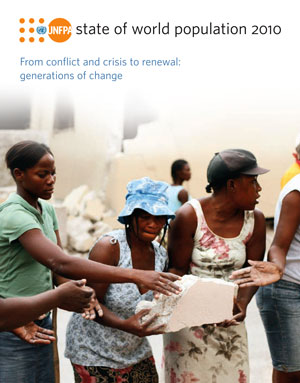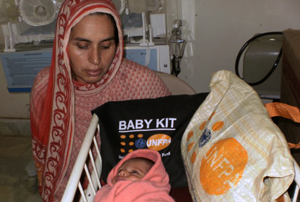20 October 2010: The United Nations Population Fund (UNFPA) launched this year's State of the World's Population report, From Conflict and Crisis to Renewal: Generations of Change [external site].
The regional launch of the report took place on Wednesday 20 October 2010 at Parliament House, and was attended by the Minister for the Status of Women the Hon Kate Ellis MP, Senator Claire Moore, the UNFPA Deputy Director for the Asia Pacific Regional Office and Representative in Thailand, Mr Najib Assifi and Marie Stopes International Chief Executive Officer, Mr Dana Hovig.
Senator Moore spoke at the launch in her role as Chair of the Parliamentary Group on Population and Development. Minister Ellis welcomed the report as a reminder to governments that whilst progress has been made, there is much more to be done to address the challenges women face in conflict and in humanitarian emergencies.
A seminar on Gender and Conflict followed the launch with a range of speakers from Australian non-government and academic organisations and the Australian Federal Police. All speakers acknowledged the need to systematically address sexual and reproductive health needs in emergency response situations.
The UNFPA report explores how conflict and protracted humanitarian emergencies affect people, with a focus on experiences from Bosnia and Herzegovina, Liberia, Uganda and Timor-Leste and emphasises that 'women rarely wage war but they too often suffer the worst of its consequences'. It recommends governments use opportunities arising from post-conflict or natural disaster recovery situations to ensure stronger rebuilding processes based on equal rights and argues that humanitarian responses must include actions that assist in long term development and peace processes.
The launch coincides with the 10th anniversary of UN Security Council Resolution 1325 which calls on parties to protect women and girls during war time from gender based violence and involve women in the negotiation and implementation of peace agreements. On 27 October AusAID will hold an official function at the High Court of Australia, in conjunction with the International Committee on the Red Cross Women and War photographic exhibition, running until 5 November.
In times of crisis reproductive health services including prenatal care, assisted delivery and emergency obstetric care, often become unavailable. Pregnancy related-deaths, sexual violence and vulnerability to HIV infection and sexual exploitation increase and many women lose access to family planning services, increasing the risk of unwanted pregnancy. AusAID is working with a range of partners to ensure sexual and reproductive health needs of women and men are not forgotten in emergency operations.
Between 2009–2012 AusAID will contribute $42.5 million to support UNFPA to improve maternal and child health and promote gender equality. An essential element of this support will be strengthening the integration of sexual and reproductive health in emergency response situations.
During the recent Pakistan floods, AusAID provided 2000 safe birthing kits for displaced pregnant women. Australia also provided $2 million to CARE Australia and World Vision for activities focusing on maternal and child health, family planning and nutrition.
AusAID is also providing $4.5 million between 2007 and 2010 to increase access to sexual and reproductive health services for people in crisis and post-crisis situations in Asia, the Pacific and Africa, through the SPRINT initiative–a sexual and reproductive health program in crisis and post-crisis situations in East, Southeast Asia and the Pacific. This aims to increase the capacity of organisations to deliver a set of priority reproductive health interventions during the early phase of a natural disaster or conflict. The SPRINT initiative has trained over 3500 reproductive health care professionals in 35 countries and is also providing funding to support reproductive health responses in protracted humanitarian emergencies in the region, including the Philippines, Indonesia and Vietnam.
AusAID support for reproductive health in emergencies is part of a broader commitment to achieve Millennium Development Goals 4 (reduce child mortality) and 5 (improve maternal health). As the aid program increases to 0.5 per cent of Gross National Income to 2015-16, on current projections, Australia will spend at least $1.6 billion over the next five years on women's and children's health. This funding will contribute to the UN Secretary General's $US40 billion Global Strategy for Women's and Children's Health [external site], announced ahead of the MDG Summit in New York on 22 September,which the UN estimates will save the lives of 15 million children under five and prevent 740,000 women from dying from pregnancy and childbirth related complications between 2011 and 2015. Australia's funding will train health care workers, equip health facilities, provide quality family planning services and expand the reach of childhood vaccination programs.
Australia is also a founding member of a new Alliance on Reproductive, Maternal and Newborn Health with the US and UK Governments and the Bill and Melinda Gates Foundation. Under the Alliance, members will be working to better coordinate our reproductive, maternal and neonatal health advocacy, financing and research efforts within countries. The Alliance will specifically address aspects of Millennium Development Goals 4 and 5 where progress has been especially slow and will focus on increasing access to family planning, expanding skilled birth attendance and facility-based deliveries, and increasing the numbers of women and newborns receiving quality post-natal care by 2015. The Alliance supports the UN Secretary General's Global Strategy for Women's and Children's Health.


